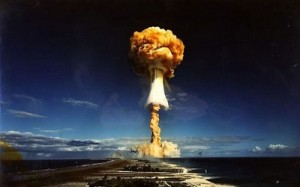Danger of Radioactive Release on a Large Scale. Whistleblower slams Japan nuclear regulation

“The problem there is, if that plutonium fuel is melting inside the core, if it’s being vented out or if an explosion were to break the containment open, we could have – and we have as much as a quarter of a tonne of additional plutonium in that reactor – we could have radioactive releases containing plutonium, which would be just yet another horror to have to deal with” .
A nuclear industry whistleblower who helped design protective containment vessels for reactors has attacked the Japanese government, its nuclear industry and regulators over their safety record.
Dr Masashi Goto, a nuclear engineer, resigned from his job at the Toshiba Corporation over safety concerns.
Toshiba supplied two of the reactors at the Fukushima Daiichi power plant that was stricken by an earthquake and tsunami on March 11.
Dr Goto criticises his country’s record on nuclear safety.
“We have the government commission overseeing nuclear safety standards and in my opinion they are not doing their job,” he told ABC correspondent Eric Campbell last Thursday in Tokyo in an exclusive interview for Four Corners.
Around 300 engineers are working round-the-clock at Fukushima to contain the worst nuclear accident since Chernobyl in 1986.
They have been spraying the reactors with sea water so fuel rods will not overheat and emit radiation. Hopes for a more permanent solution depend on connecting electricity cables to reactivate on-site water pumps at each of the reactors.
Working in suits sealed by duct tape, engineers have managed to re-establish power cables to the No. 1, 2, 5 and 6 reactors and plan to start testing systems soon.
Bur Dr Goto says the Fukushima crisis shows Japan has not yet learned the lessons of history.
“At Three Mile Island the nuclear fuel melted. Fuel is melting here now,” he said.
“We have to design reactors to withstand melting fuel rods. Right now the reactor will break down due to the heat generated by the melting rods.”
Dr Goto alleges that in Japan’s nuclear industry profits take precedence over safety standards.
“No-one says it officially or openly. When setting standards for future earthquakes, the thought is of money – how much is it going to cost?” he said.
“This underlies the government’s decision making. They are thinking the costs could have a bad repercussion on the economy.”
Dr Goto says one of his special research interests at Toshiba was how to make containment vessels stronger.
He says Japan’s nuclear safety standards have been based on an insufficient acknowledgment of the potential severity of natural disasters.
“What’s wrong with the standards is that the anticipated level of the worst-case-scenario earthquake is not correct,” he said.
“Seismologists have different opinions and predictions. Some say bigger quakes are coming. Others say a big one is unlikely.
“Decisions have been made based on the opinion of the more optimistic seismologist and the opinions of the pessimistic ones are ignored.”
The earthquake that shook Japan on March 11 was magnitude 9.0 – the strongest recorded earthquake in Japan, and far stronger than the country’s nuclear industry had anticipated.
Despite this, the Tokyo Electric Power Company, which operates the Fukushima plant, boasted in its corporate publicity that its nuclear power stations were “designed for the largest conceivable earthquake” and that “all designs provide margins of safety capable of withstanding even natural disasters”.
Grim warnings
Further grim warnings are given in tonight’s Four Corners by nuclear experts and activists who have been interviewed over the past week.
American Damon Moglen, director of Friends Of The Earth’s climate and energy project, points to the presence of as much as a quarter of a tonne of plutonium in Fukushima’s No. 3 reactor, which suffered an explosion last Monday.
“The problem there is, if that plutonium fuel is melting inside the core, if it’s being vented out or if an explosion were to break the containment open, we could have – and we have as much as a quarter of a tonne of additional plutonium in that reactor – we could have radioactive releases containing plutonium, which would be just yet another horror to have to deal with,” he said.
Dr Ziggy Switkowski, former chairman of the Australian Nuclear Science and Technology Organisation (ANSTO), warns the crisis at Fukushima has done a “great deal of damage” to the industry.
“The nuclear industry has, over time, worked as well as it has because of people’s confidence in the integrity of reactors and acceptance that many of the issues associated with the management of spent fuel and waste were properly handled,” he said.
“But we’ve always understood, and we saw this happen in Three Mile Island and Chernobyl, that if the community trust is breached by whatever development, it will take a long, long time to recover it.
“I think this is a turning point for the industry.”

